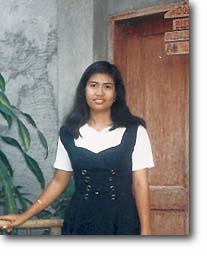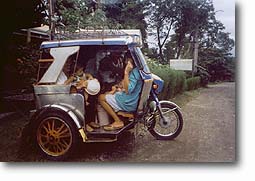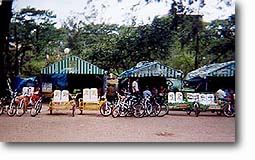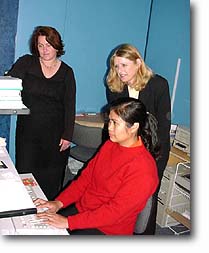An Interview With Dulcebelle Brears
Dorothy – 9/11/01
|
|
| Dulcebelle Brears Photo Source Dulcebelle Brears |
To leave home in the Philippines and travel to New Zealand to marry her New Zealand penpal Robin, whom she had never met in person – this meant not only adjusting to life with a person from another culture, but also learning to live in a different lifestyle in a different climate and no longer speaking her native language.
Dulcebelle Brears talked to me of this experience and hopes that by sharing her thoughts she will help other women who are considering making a similar decision.
Dulcebelle’s life and education in the Philippines Dulcebelle was born in one of the smaller towns in her country, As her mother had a job she was cared for by a nanny until she was old enough to attend primary school. This school had around six hundred pupils and from Grade 1 to 6 she was in a class of some fifty pupils. They were all expected to sit quietly throughout the school day. If they talked they would probably be punished by being made to stand in front of the class for the rest of the day. The schoolroom was a very quiet place and the pupils were not encouraged to express their ideas. As well as reading and writing in the Filipino language and maths, they were taught American English. Dulcebelle’s favourite subject was maths. Boys were taught carpentry and gardening and girls learnt needlework, crochet and knitting.
Next came secondary school where pupils studied for eight semesters and were expected to pass the examinations in all their subjects. Those who failed had to study those subjects again, but were allowed to progress into the next class.
Dulcebelle went on to four years of tertiary study and gained a degree in accountancy. She lived in a hostel from Monday to Friday and returned home for the weekends. She explained to me that in the Philippines young women live with the family whenever possible until they are married.
Career in the workforce To find a job where she could use her qualifications Dulcebelle had to move to another province where she got work in a lending institution. Family living and close family ties were still important for her and she lived with a family who were relatives. From Monday to Friday she worked from 8 am to 5 pm with an hour’s break for lunch. She bought a takeaway for her midday meal. She also had to work on Saturday morning.
Free time Her free time in the evenings and at the weekend was spent helping the family with household chores. The family was privileged as instead of living in an apartment they had a house and garden, so Dulcebelle helped with gardening at the weekend. The men in the family had special rights and were not expected to help with the chores. Dulcebelle’s only outing at the weekend as a rule was attendance at Mass.
Christmas Christmas is celebrated as a family time so she returned to her home for the festive season. For Christmas presents they usually gave new clothes.
Radio programmes popular There was little sport played and most families had no television. People were very interested in listening to the radio, in particular the soap operas.
Food The food that was served in her home in the Philippines was a simple rice-based diet, with fish and vegetables and interesting sauces combined in the rice dishes. Meat was not a feature in the diet.
Climate The temperatures were a lot warmer than those in Christchurch, and the seasons were different and clearly differentiated between the dry season and the rainy season which lasts from June to September.
What a contrast to come to the New Zealand way of life! As the plane headed to Christchurch Dulcebelle thought how beautiful everything looked, in particular the greenness of the countryside and the gardens in the city. She arrived in July 2000, the coldest time of the year,
and needed different warm clothes as she adjusted to the colder climate.
Transport As she came into the city she was struck by the traffic flows – so much lighter than in the Philippines. She also missed the choice of types of transport. Here if you do not own a car or a bicycle the only option for travel is a bus, whereas at home she could choose among a pedicab which is a bicycle which can carry two passengers, a motorised tricycle which can take up to six passengers, or a jeepney, a small van which can take two passengers beside the driver and up to sixteen people on the benches in the back of the vehicle.
|
|
| Tricycle Photo Source Dulcebelle Brears |
|
|
| Pedicabs Photo Source Dulcebelle Brears |
|
|
| The Jeepney Photo Source Dulcebelle Brears |
The buildings in the city of Christchurch seemed small compared with the very tall buildings in the city of Manila. There even the shopping malls are high rise. Food As she is responsible for the cooking Dulcebelle is able to cook a mixed diet – some of the Filipino dishes that Robin and the children also enjoy, and some New Zealand food. When she first arrived Robin taught her how to cook New Zealand meals. Meat is a novelty for Dulcebelle and she really enjoys a roast dinner. She describes New Zealand food as simpler than what she cooked at home with fewer sauces served with the meal.
Language Dulcebelle had learnt English at school and had spoken it at times in the Philippines, but like most of us who try speaking a new language she found at first that most native speakers, including her husband and his children, spoke too quickly for her to understand them easily. She has continued to work at her English finding now that idioms and colloquialisms are the main problem.
Linkz a helpful publication Four times a year Dulcebelle receives a copy of Linkz a publication put out by the New Zealand Immigration Service and the Department of Labour. In addition to articles giving immigrants important information about matters like taxation, employment, and buying a home, it includes a section on language. In the issue she showed me a number of idioms were listed and explained. Many related to hands and feet:
| to have green fingers | – to be good at gardening and growing things. |
| to put your foot down | – to be firm, and insist on something. “My daughter kept borrowing my car, so I finally put my foot down”(said no). |
| My foot! | – I don’t believe you! |
At first shopping in English seemed strange but Robin accompanied her to the supermarkets and other shops until she became more confident about shopping in English and in New Zealand currency. She and Robin shop for food together so that the heavy parcels can be taken home by car.
The life of New Zealand children Robin’s son and daughter live a very different kind of life from the way Dulcebelle was brought up. Like most New Zealand children they have been encouraged to express their ideas and are prepared to argue with their parents – which would not have been tolerated in a Filipino home. They go out much more than Filipino children. Her twelve year old stepson plays soccer and her nine year old stepdaughter is keen on athletics. They enjoy watching sport on television.
They are given pocket money to spend as they choose, but Dulcebelle was given only lunch money and had no freedom about spending.
Finding employment a problem Getting a suitable job in Christchurch proved really difficult for Dulcebelle. She naturally wanted to work in an area where she used her tertiary training.
When she searched the newspaper advertisements or went to the New Zealand Employment Service the only jobs available were in factories.
Job training Finally she saw in the Christchurch Star newspaper an advertisement for job training. She talked to the interviewer at the Salvation Army Employment Plus Training course and was accepted for a six month course training her in office work and computer skills. At home there were few organisations to help people find jobs. To attend such a course in the Philippines she would have had to pay fees, but this course was funded by Skill New Zealand, so the training was offered free.
|
|
| Jenny, Dulcebelle’s tutor (right), and Barbara, a fellow student, work with Dulcebelle. |
Dulcebelle has found attending the course a very worthwhile experience. Not only has she learnt office and computer skills, but she has become more confident about communicating. There are eight students on the course, five Kiwis, one student from England, one from Vietnam and Dulcebelle from the Philippines. They have their own full time tutor and Dulcebelle has found her a very approachable person. Those who successfully complete the course will hold the National Certificate in Business Administration and Computing Level 2.
When I asked her what part of the course she has found most difficult she said that it was improving her English as she struggles with the different tenses of English verbs. She is also working at changing her spelling of English from the American spellings she was taught at home to the English spellings accepted in New Zealand.
As I talked to her I was impressed with the standard of her English and the efforts she was making to appear more confident – a change that will improve her chances in the New Zealand job market where the very quiet voice and shy demeanour of many Filipino women is not always understood and valued.
Keeping in touch with family in the Philippines Dulcebelle keeps in touch by email with her sister in Manila, and writes regularly to her parents and makes the occasional phone call to them, so the ties with home and family are strong.








